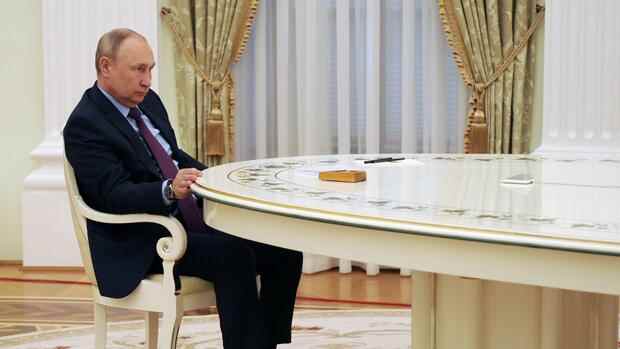Geneva The Secretary-General of the United Nations, António Guterres, felt compelled to make clear statements. After Russia recognized the rebel areas of Luhansk and Donetsk in eastern Ukraine as independent states, Guterres said Russia’s actions violated Ukraine’s territorial integrity and sovereignty and were “incompatible with the principles of the United Nations Charter.”
The United Nations Charter is considered the central set of rules, the basic law of international relations. And according to the UN Charter, the matter is clear: All UN members shall “settle their international disputes by peaceful means.”
All members refrain from the “threat or use of force” in their relations with other states. These obligations are binding for all members – including Russia.
In the Ukraine crisis, however, Russia apparently no longer cares about these provisions of the UN Charter. And the nuclear-weapon state is also violating other relevant international agreements: from the Helsinki Final Act to the Budapest Memorandum to the Minsk Agreements.
Germany and France had placed their hopes in the Minsk provisions in particular in order to defuse the Ukraine crisis.
The agreements provided for a ceasefire and a roadmap for peace in eastern Ukraine, while respecting the sovereignty and territorial integrity of the state of Ukraine.
It is true that Kiev did not comply with all of the Minsk requirements, which lack a clear implementation plan. But by recognizing the rebel areas, Russian President Vladimir Putin has finally torn up the Minsk agreements.
Putin proceeded step by step: First, he demanded that the western military alliance Nato should refrain from any further eastward expansion. Then he allowed the conflict with the neighboring country and the West to escalate. There was a threatening deployment of troops on the borders with Ukraine, the recognition of the pro-Russian rebel areas, and the deployment of Russian military units.
By granting statehood to the rebel areas, Putin denies Ukraine’s statehood. And he creates the conditions for the illegal annexation of the regions by the Russian Federation.
“In the event of a further military escalation, Europe is now in danger of falling back into an age of high confrontation like in the Cold War,” warns the former Secretary General of the Organization for Security and Cooperation in Europe, Thomas Greminger, in an interview with the Handelsblatt. “Then the central pillars of the European security architecture would be further undermined.”
history repeats itself
Putin had already broken the UN charter in 2014 when he wrested the Crimean peninsula from Ukraine and fomented the armed uprising against Kiev in the eastern Donbass region.
As a permanent member of the UN Security Council, Russia can afford the interplay of intimidation, deception and violence. With its right of veto, the Kremlin protects itself against all unwelcome decisions by the Security Council, including global sanctions.
At the European level, the Helsinki Final Act continues to shape the coexistence of states: In 1975, the political leaders of 35 countries put their signatures under the Act at the “Conference on Security and Cooperation in Europe” (CSCE).
In addition to European participants such as the Federal Republic of Germany and the GDR, the USA, Canada and the Soviet Union, Russia’s predecessor state, committed themselves to the jointly formulated goals.
It is true that the CSCE Final Act is not a legally binding treaty, but a political declaration of intent. Nevertheless, the extensive compliance with the guidelines is still considered good manners on the continent and is considered an indicator of the reliability of the signatories.
The catalog of principles in the Final Act ranges from the renunciation of the threat or use of force to the inviolability of borders and respect for territorial integrity. In addition, states agree to settle disputes peacefully.
More on Putin in the conflict with Ukraine:
Russia, however, is flouting almost all of these principles in a showdown with Ukraine and the West. “When a powerful state like Russia so brutally ignores international principles, this is of course not a good example for other states and can lead to a brutalization of morals,” warns a diplomat in Geneva.
In order to preserve a remnant of Russia’s credibility, Foreign Minister Sergey Lavrov referred to a conference in Istanbul in 1999 in the Ukraine crisis.
Reference to 1999 agreements.
(Photo: imago images/SNA)
At that time, the states of the Organization for Security and Cooperation in Europe, the successor to the CSCE, agreed on another document: the European Security Charter. It states that participating States “will not strengthen their security at the expense of the security of other States”.
Moscow is now arguing that Ukraine’s NATO membership would be tantamount to a threat to Russia and would therefore be incompatible with the European Security Charter. However, Kremlin strategists are reluctant to be reminded that the European Security Charter also reaffirms the right of each participating state to “freely choose alliance treaties”.
On the other hand, Moscow’s leadership brushed aside another agreement in 2014 in the course of the military occupation of Ukraine’s Crimea: the Budapest Memorandum of 1994.
In it, the three nuclear weapons powers Russia, Great Britain and the USA gave the three states of Ukraine, Belarus and Kazakhstan security guarantees against threats to their territorial integrity or political independence. In return, Ukraine, Belarus and Kazakhstan gave up their arsenals of Soviet-era nuclear weapons. Today the memorandum is history.
More on this: On the brink of war: Putin goes all out – order to send troops to eastern Ukraine
